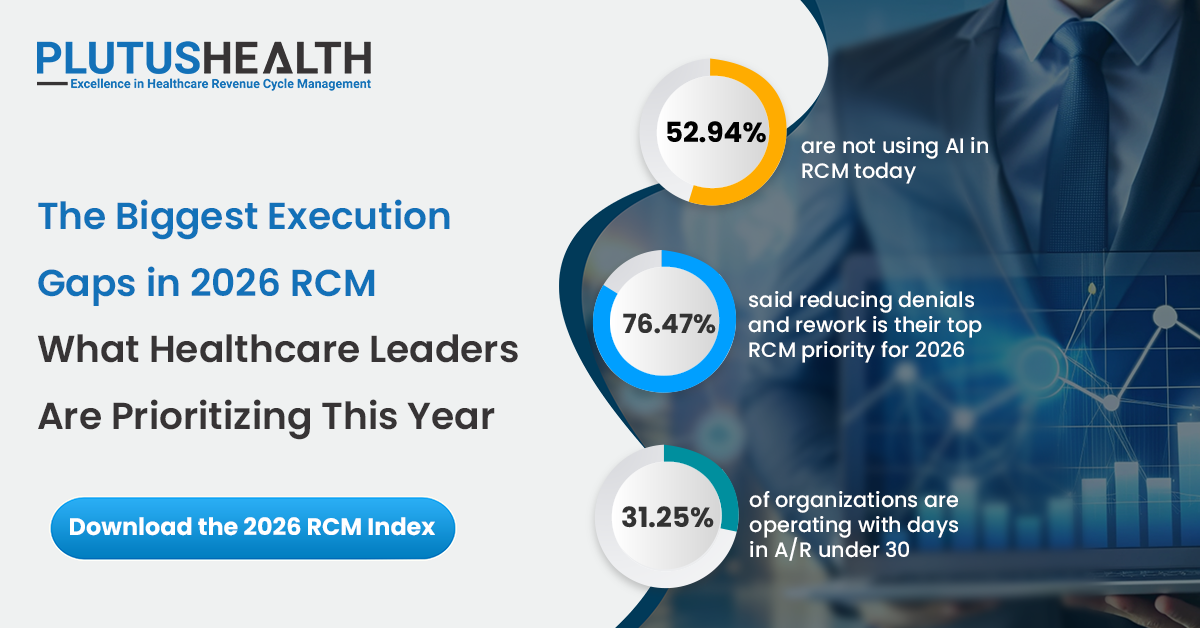Medical Coding Audits: Overview, Benefits & Best Practice
Medical coding audits play a critical role in healthcare revenue cycle management. Healthcare providers often struggle with medical coding quality either due to a lack of knowledge or insufficient certified medical coders. Medical coding audits help healthcare providers detect flaws in their coding procedures, reduce coding errors, and increase productivity.
Regular coding audits help to find outdated codes, wrong modifiers, improper codes used, or even flaws in medical billing procedures. Healthcare providers can benchmark the coding KPIs and maintain compliance.
In this blog:
- Why conduct a Medical Coding Audit?
- What is the process of medical coding audits?
- What are the types of medical coding audits?
- Benefits of medical coding audits
- Internal Vs external coding audits
- How often should you conduct a medical coding audit?
- What are the goals of medical coding audit?
- How Plutus Health can solve your medical coding audit needs
Medical coding audit is an external or internal review of medical coding procedures. A coding audit includes the evaluation of the reliability and effectiveness of diagnosis codes and procedural selection in the medical coding process. This process checks medical records maintained by healthcare providers and reviews billing data submitted by insurance payers to aid practices in monitoring, identifying, and correcting inappropriate coding practices.
Medical coding audits help healthcare providers eliminate coding errors and minimize denials. If you don’t perform regular coding audits, it will lead to lost revenue or exposure to compliance risk. A report by HFMA (Healthcare Financial Management Association) claims denial amounted to healthcare providers about $235 billion in 2021.
Regular coding audits can help you find current coding problems and provide knowledge to streamline coding procedures and improve policies.
“Conducting regular medical coding audits help healthcare providers to streamline their procedures and improve revenue,” said Gett Johnson, RCM expert at Plutus Health.
Here are a few of the most common issues that medical coding audits can detect:
Up-and under-coding
Medical coders often incorrectly represent the service given to the patients. Up-coding is updating more costly services than performed, while under-coding is updating less expensive services than performed.
Outdated coding
Medical coders should know all sets of codes, including CPT codes from AMA, ICD codes from WHO, and HCPCS codes from CMS. These sets of codes get updated annually. Medical coders should know the latest sets of codes, as using outdated codes leads to compliant risk and lost revenue.
Unbundling
Unbundling is if the medical coders use multiple CPT codes instead of a single code. Unbundling occurs if the coders do not update themselves with the latest ICD-10 codes, or it can be an intentional up-coding.
Lack of documentation
Medical coding is dependent on the documents provided to the medical coders. If medical coders get improper documents, there will be errors in coding which would lead to denials.
Prevent compliant risks
Compliance is the biggest reason for medical coding audits. Medical coding should comply with the payer’s policy, Medicaid and private payers, Medicare, and OIG (Office of the Inspector General).
Medical coding audits reveal coding problems and open new opportunities for healthcare providers. It also gives an analysis of the processes that are done right. There are multiple reasons to do coding audits, but protecting the organization from compliance is always the priority.
Select if you want to do an internal or external coding audit
Healthcare providers should have a team who can conduct regular coding audits to prevent denials, revenue loss, and compliance risk. Healthcare practitioners can also connect with medical coding outsourcing companies who provide coding audit services. External coding auditors provide insights into the revenue impact of coding errors that internal auditors might miss. Sometimes it could be challenging to trust external auditors, but the amount of precision and experience they bring can be challenging to achieve by internal auditors. So you should choose wisely whether to choose internal or external auditors.
Search for an auditor
If you choose to go with external medical coding companies, the next step is to contact the company that provides medical coding audit services. Medical coding auditors are skilled in particular subspecialties if you need precise coding audits. Coding auditors are not just certified but also updated with coding and regulatory changes by the payers and state.
Establish the scope of audit
You should create a scope of the audit and discuss with the auditors what works best and what needs to be avoided for your practice. The scope determines what needs to be reviewed in the audit process. The scope should be balanced so that you get all the results deserve and you do not require extra money or time.
Look for irregularities
Medical audits help healthcare providers to detect errors leading to denials and affecting the clean claims ratio. Here are the filters you should look at while conducting coding audits.
- The code should match the ‘reason of visit
- Outdated codes should not be used
- Secondary codes and modifiers should support primary codes
- Only the latest and updated codes are used
- All improper medical codes should be corrected
Find unrelated codes
You should check the codes and modifiers unrelated to diagnosis or procedures. If the medical coders use unrelated codes, it raises a red flag for payers. Too many red flags result in an investigation. The investigations agencies presume that the practice is trying to conduct fraud.
Check for outliers
You should check for coding patterns that are out of the standard trends. Compare your coding practices with the standard trends to detect processes outside the standard norms. Coding audits can help to improve coding patterns by detecting outliers. You can also find all the coding errors and address them instantly.
Continuous improvement
The primary purpose of coding audits is to improve your practice. You should communicate all the coding audit results with the team and learn from the mistakes. Create an improvement plan depending on the coding audit finding and start working on the growth of your practice. Even the best medical coders need education and training to stay updated in this highly dynamic domain.
- Retrospective (Post-bill)
- Prospective (Pre-bill)
- Internal
- External
Retrospective (Post-bill)
In this audit, the specialist looks at the claims that are submitted to the payers (usually from the last three months). Post-bill coding audits help to get an in-depth understanding of coding trends by comparing the present and past audit results.
Prospective (Pre-bill)
In pre-bill audits, the professionals look at the claims before submitting them to the payers. The advantage of a prospective audit is that you know about the coding mistakes before submitting the claims to the payers.
Internal
The in-house team of healthcare practices conducts internal audits. These audits can sometimes be biased but are comparatively less expensive. Internal audits can be erroneous due to the incomplete knowledge of the auditors.
External
Medical coding audits conducted by a team of experts outside the healthcare organization are called external audits. You get the highest quality of results as the team is non-biased and has extensive knowledge in the field of medical coding.
“Avoid billing for unnecessary services and up-coding to prevent your practice from heave penalties and compliance risk.”
Organizations that conduct regular coding audits have seen an inclined growth in their FPAR. Medical coders know the common coding errors and now code precisely to submit clean claims.
You should know how coding audits from medical coding services companies help your practice grow and achieve desired goals. Here are the benefits of medical coding audits.
Reduce fraud & increase compliance
64% of medical billing errors result from a lack of documentation. Billing fraud and compliance is the most critical problem in the healthcare industry. Here are some of the most common reasons for improper medical billing:
- Improper documentation
- Incorrect coding
- Insufficient medical necessity
Frauds are caused due to up-coding, billing for unnecessary services, or billing for services not provided to the patients.
Medical coding audits from medical coding consulting companies can help you find fraud and improper billing activities. You can get accurate information on your staff training and billing procedures. Coding audits can also help you eliminate intentional fraud or coding errors. You can ultimately reduce compliance risks and save your practice from heavy penalties.
Protect the bottom line
Coding mistakes lead to claim denials, ultimately increasing the revenue loss for healthcare providers. If the claims are not coded properly, they won’t get complete reimbursements. If the claim is denied, it takes considerable time and effort to resubmit them.
Proper medical coding audits will detect the areas leading to revenue loss. Once you get to know the areas at fault you can make the necessary changes to avoid future losses.
Improved clinical documentation
Clinical document errors can lead to loss of revenue. If there are document errors, the chances of claim rejections and denials increase. Medical coding audits help you detect clinical documentation mistakes. Your staff can learn from these mistakes and ensure they don’t repeat them. You can increase your clean claim ratio if all the documents are properly submitted to the payers. A high clean claim ratio means you will have a continuous cash flow in your practice.
Improved operational effectiveness
Submitting claims to get reimbursement from payers is not just the responsibility of medical coders. Coding audits help you detect flaws in your coding processes and improve operational effectiveness. Your team should properly coordinate with each other to streamline the complete RCM process.
Avoid denials
The average annual cost to work on denials is around $9 billion for healthcare providers. Coding errors are the major cause of these rejections and denials. If you can detect and rectify the common coding mistake, 70% of your denials can be easily reduced.
Medical coding audits help you find the common causes of coding errors. You can work on these coding mistakes to avoid denials and increase your FPAR.
Provide education
Medical coding audits aid you in educating your staff on coding. Investing your efforts and time in coding education has long-term benefits on the revenue of your practice. You can reduce lost revenue and fraud with proper education. Here is how you can leverage coding audits to educate your staff.
- Use audit results as a conversation point with your staff on medical coding. Ensure your staff that the medical coding audit is not to discreet their work but is an opportunity to improve.
- Seek help from the coding team to set a new coding KPIs benchmark based on audit results.
- Create a library of resources and update it regularly to educate the staff on the latest coding guidelines and rules.
- Encourage your coding team to ask questions on coding audit results and improvements they can make to avoid future errors.
- Create an education program where you can schedule regular sessions to improve your overall coding and billing process.
Increase accuracy
In 2016, the average coding accuracy for inpatient cases was 55%, while 61% in 2017. Coding accuracy was even lower for the emergency department and ASC.
Accurate medical coding is required to prevent compliance risks and enhance the overall quality of patient care.
“Accuracy of medical coding affects impact healthcare provider’s risk adjustment and quality reporting.”
Medical coding audits can aid in detecting issues like incorrect documentation that impact the coding quality. Improper documents impact patient records and make it difficult for coders. Coding accuracy is also essential as the need for value-based reimbursements involves.
Rectify modifier usage
Medical coding is the combination of codes and modifiers. If medical coders make errors in modifiers, it might result in heavy revenue loss or denials. Medical coders don’t realize the importance of modifiers and make mistakes. Modifiers should be appropriately supported with documents to avoid complexity. Coding audits help to detect errors in modifiers and help you to make corrections before submitting the claims.
Increase your revenue flow
Performing a coding audit help to detect the problems that lead to a decline in your organization’s revenue. 70% of the medical coders revealed that their organizations lose revenue due to common issues like improper documentation, unbundling, and under-coding. Coders demand proper documents to verify if the services were given to the patients. With the correct codes and documents, you can increase your cash flow. Coding audits also help to detect reasons for past denials. These denials can be worked on to get reimbursements.
You might be confused about whether to conduct internal or external medical coding audits. Here are a few points that could help you choose between both options:
Internal medical coding audits
Medical coders are trained to perform coding audits for individual providers or small organizations. Staff in-house members of a healthcare organization conduct these audits. Large facility or group providers have a dedicated internal team of auditors who review coding processes and procedures.
While performing an internal medical coding audit, many steps should be considered to understand the scope of the audit. Here are the questions you should ask when performing an internal audit:
- What will be the sample size while conducting coding audits?
- Will your coding audit cover all payers or only specific payers?
- What are the common coding and billing procedure in your practice?
Internal auditors should know the areas of high compliance risk and consider regulatory compliance. You should prioritize the new areas which were missed in the previous coding audits. Finally, you should thoroughly examine the results and create a future growth plan according to the findings.
External medical coding audits
Medical coding companies provide coding audit services that are objective-oriented and result-focused. Organizations conducting external audits offer advanced services that healthcare organization does not accomplish internally.
While conducting an external audit, you do not need to do an auditing process but stay ready for the results. You can set the goals and expectations for the external auditors and monitor them during the process. You should also prepare your coders for the work coming after the audit.
Medical coding audit is stressful. Coders should know that the audit will help them to improve and not tear them out. You should also be ready to give access to records and communicate with the coding team.
External coding audit is an opportunity to develop and grow. You should adequately note down the audit findings and work extensively on the suggestions.
There is no such period in which you should conduct a medical coding audit. The frequency of medical coding audits depends on regulatory updates, staff turnover, and organization size. Though, it is recommended that you should conduct it once a year. But healthcare providers choose to conduct monthly coding audits to maximize benefits which facilitates the improvement of clinical documentation, increases consistency, enhances coding productivity, and reduces compliance risks.
Coding audits increase the frequency of catching errors, thus recapturing more revenue and rectifying the mistakes resulting in lost revenue. Analytics reports can aid in keeping medical coding records updated according to the latest guidelines and eliminate errors.
For annual reports, you must be prepared for the process well before the actual audits. Coding updates by American Hospital Association Central get released every quarter. Monthly audits can detect if all the updates get properly implemented. With monthly audits, you can frequently see areas of clinical documentation improvement. You can conduct audits monthly, quarterly, or yearly. But the sooner the lost revenue, errors, and inaccuracies are detected, the better your ROI.
Medical coding audits are conducted to detect flaws in the coding process and streamline the RCM process of healthcare organizations. There are many goals to conducting a medical coding audit, but you should primarily keep in mind these.
- Detect the flows in clinical documentation
- Check for wrong use of modifiers, over-coding, under-coding, or unbundling
- Discover the use of improper medical codes
- Find out the payer’s rules if the billing done is improper
- Uncover the intentional/ unintentional coding frauds
- Identify errors in coding software or scrubbers
- Prevent a visit from RAC (Recovery Audit contractor)
Plutus Health’s coding audit services are designed according to your needs. We have a team of certified coders to help you streamline your medical coding services. Our inpatient & outpatient coders can eliminate coding errors, detect problem areas, provide education, and take prompt actions to eliminate denials.
We provide medical coding audit services, which is crucial for your practice’s success. Coding audits are all about detecting, removing, and preventing coding errors, and we are the US's leading coding audit service provider. Plutus Health has been providing coding audit services to healthcare providers in all specialties for 15+ years. We have consistently delivered exceptional services to all our providers. You can click here to schedule a coding audit with Plutus Health.





















































